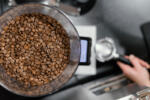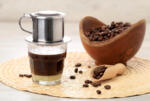To maximize your investment, you must maintain your coffee machine properly. One of the important methods is to descale your machine to get rid of the nasty mineral buildup using a citric-based solution. While you can go ahead and purchase a descaling solution, you also have the option to create your own!
Is my coffee maker dirty?
While a coffee machine may seem like it does not house a significant amount of unwanted particles, you’d be surprised at how much of a good environment it is to nourish germs, bacteria, and mold. Also, it houses hot water, so that should do the job, right? Add to that the fact that caffeine is a natural antimicrobial. But unfortunately, life does not work that way.

In one of our tests to find the truth, our team discovered mold growing in the water tank in our Keurig machine. It was so nasty. I can’t forget how disgusted I was when I saw it! Thus, you must keep this in mind to keep cleaning and descaling your machine!
What do health and science experts say?
A local news station randomly swabbed 10 home coffee machines around Chicago to give the specimen to a microbiologist named Roman Golash at Loyola University for inspection. He discovered gram-positive bacteria strains, including staphylococcus, streptococcus, bacillus cereus, and e-coli.
Also, a research study in 2011 by the NSF International revealed similar results with the added knowledge that coffee machines had the most germs among all the other areas in the bathroom and the kitchen.
Now, if you still don’t find the need to clean your machine, I don’t know what will.
But how do germs get into coffee machines?
To begin, bacterias adore hot and moist environments. They just relentlessly thrive there. Also, calcium and magnesium naturally form in layers and are collectively called the limescale. It’s that nasty, chalky, off-white substance you find in the crevices of any appliance that gets in contact with water.
Descaling a coffee maker
Your descaling practice depends on the hardness of your water. Hard water has a higher mineral content compared to soft water. The minerals are mostly calcium, limestone, and magnesium which can build up over time. Once the buildup becomes significant, it can influence the taste of your coffee and even block holes and passageways. To remove these, you have to descale as needed.
5 DIY descaling solution
Vinegar

The acidic vinegar is here to save the day, once again.
What you’ll need
- ⅓ cup vinegar
- ⅔ cup water
Instructions
- Mix vinegar and water in a container.
- Throw the solution into your coffee machine.
- Let that sit for a few minutes.
- Rinse.
- Check the machine and repeat steps 1-4 as needed.
- Rinse thoroughly until the vinegar smell disappears.
You may also use this solution to clean the exterior of your machine, as vinegar is one of the best stain removers you can use.
Pros
- Very cheap
- Easy to access
- Applicable to the exterior of the coffee machine
- Vinegar is effective in removing excess minerals
Con
- While it’s effective, it still is not the best option out there when it comes to limescale.
Citric acid
If you hate the smell of vinegar, you can try citric acid instead. However, since citric acid has a lower pH level than vinegar, you may have to run your machine with more cycles with this cleaning agent.
What you’ll need
- 1 tablespoon of citric acid pellets
- 1 gallon of fresh water
Instructions
- Mix the citric acid pellets with water in a container.
- Pour the solution into the water reservoir
- Run a cycle.
- Let it sit for a few minutes.
- Repeat the previous steps as needed.
- Rinse thoroughly.
Pros
- Affordable
- Easy to use
Con
- May create a build-up within your machine over time. To deal with this, use different products. For example, you may use citric acid descaling solution for 3x and use a commercial descaler the 4th time.
[amazon bestseller=”citric acid pellets” items=”3″ template=”table”]
Water softening pellets
This is one of the most time-efficient means to clean your coffee machine. Of course, you will need a water softening system, but this is guaranteed to be effective, quick, and easy to do!
Follow the instructions with your water softening system, throw it into your machine, and clean!
If your home has a water softening system, you should keep a bag of water softening pellets, such as Morton Salt, on hand. Dissolve a handful in water and run your machine to observe the effects. Because of the absence of flavor from utilizing salt pellets like these, it probably takes the fewest cycles to rinse your coffee machine.
Baking soda

You can use baking soda both in and out of your machine, and yes, that includes your water tank, pod holder, and water filter!
What you’ll need
- ¼ cup baking soda
- 1 cup of hard lukewarm water
Instructions
- Fill the carafe and fill it with water.
- Throw in baking soda and swirl it around until dissolved.
- Pour the solution into the reserve tank.
- Let the solution run through a cycle.
- Then, fill the reservoir with clean water for the second cycle to rinse.
Pros
- No aftertaste
- No residual scent
- Cheap
Lemon juice

Lemon juice is also a great means to descale, thanks to its acidic nature!
What you’ll need
- Equal parts lemon juice and water
Instructions
- Mix lemon juice and water.
- Pour the solution into the tank.
- Run through a cycle.
- Then keep running cycles with clean water only to eliminate the lemon taste.
Additionally, lemon can also clean grout naturally. Spritz on some water and lemon juice and scrub gently to eliminate the ugly mold or hard water stains. However, if your grout is colored, you might want to use another method since lemon may cause discoloration.
Commercial decalcifiers
Commercial descaling solutions utilize descaling agents such as citric acid, sulfamic acid, and lactic acid. For example, Keurig utilizes citric acid, while Nespresso uses lactic acid as the main ingredient for their descalers. But are they just ripping us off?
The quick answer is: NO. Most coffee makers have aluminum parts that can corrode if not descaled properly. Branded commercial descalers prevent this by installing corrosion inhibitors to protect your coffee machine. Thus, if you can afford them, it’s best to stick to them.
But if you don’t, you can still stick to your homemade descaler as long as you observe proper portions. For instance, use 1.5 tablespoons of citric acid for a quart with espresso machines with aluminum boilers. Then, limit the use of the solution for up to 10-12 minutes only when cleaning the inside. You should also run it out of the group head and steam wand while the new solution gets into the machine.
Take note that if your coffee maker has some copper or brass build inside, water may come out with a slight tint of green, and that’s normal. If your machine is single-serve, use a quart of the solution only.
Now, if you ask me my preference, my take is that I like using commercial descaling products. However, there are some affordable yet efficient ones in the market. For one, I save time, and it also gives me peace of mind knowing I’m putting in something meant to work well with my coffee maker.
Check out the best descaling solution to buy.
Limescale prevention
The harder your water is, the more calcium carbonate it contains, and the thicker the scale buildup. So we recommend using mineral-free distilled water for a better-tasting coffee and less frequent descaling. This will be the best for your coffee maker and make your investment worthwhile.
FAQs
When to descale my coffee maker?
For an espresso machine, descale every month if you use hard water. It is also recommended to descale your machine before leaving for a vacation to prevent mineral buildup while you’re away.
How often should you descale a coffee maker?
What happens if I don’t descale my espresso machine?
- Clogging of hard water deposits
- Temperature reduction
- Poor extraction
- Bad flavor
- Inadequate cooling
- Damaged internal parts
Final thoughts
There are a handful of ways to descale your machine using some things you readily have at home. As long as you use them in recommended proportions and time limit, you’re good to go!
Disclaimer: This post contains affiliate links, which means I may receive a small commission, at no extra cost to you, if you make a purchase using these links. Remember to support us by purchasing through the Amazon/Walmart/Impact Radius links provided. Last update on 2024-04-29 / Affiliate links / Images from Amazon Product Advertising API
Disclosure: No compensation or free products were received in exchange for writing this review.

Editorial Staff
The editorial staff at Crazy Coffee Crave is a team of coffee enthusiasts & Baristas who enjoy the one thing we all think about as soon as we get up in the morning. Trusted by thousands of readers worldwide.






